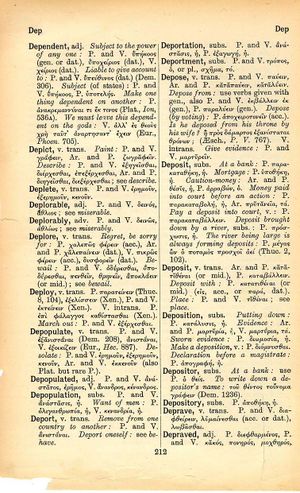dependent: Difference between revisions
From LSJ
Φίλιππον ἐπιστῆσαι τοῖς πράγμασι τούτοις → let Philip have a hand in the business, surrender control to Philip
(CSV3) |
m (Text replacement - "<b class="b2">Ion</b>" to "''Ion''") |
||
| Line 8: | Line 8: | ||
<b class="b2">Subject</b> (<b class="b2">of states</b>): P. and V. [[ὑπήκοος]], P. [[ὑποτελής]]. | <b class="b2">Subject</b> (<b class="b2">of states</b>): P. and V. [[ὑπήκοος]], P. [[ὑποτελής]]. | ||
<b class="b2">Make one thing dependent on another</b>: P. ἀνακρεμαννύναι τι ἔκ τινος (Plat., | <b class="b2">Make one thing dependent on another</b>: P. ἀνακρεμαννύναι τι ἔκ τινος (Plat., ''Ion'', 536A). | ||
<b class="b2">We must leave this dependent on the gods</b>: V. ἀλλʼ ἐς θεοὺς χρὴ ταῦτʼ ἀναρτησαντʼ ἔχειν (Eur., ''Phoen.'' 705). | <b class="b2">We must leave this dependent on the gods</b>: V. ἀλλʼ ἐς θεοὺς χρὴ ταῦτʼ ἀναρτησαντʼ ἔχειν (Eur., ''Phoen.'' 705). | ||
}} | }} | ||
Revision as of 13:54, 7 August 2017
English > Greek (Woodhouse)
adj.
Subject to the power of any one: P. and V. ὑπήκοος (gen. or dat.), ὑποχείριος (dat.), V. χείριος (dat.).
Liable to give account to: P. and V. ὑπεύθυνος (dat.) (Dem. 306).
Subject (of states): P. and V. ὑπήκοος, P. ὑποτελής.
Make one thing dependent on another: P. ἀνακρεμαννύναι τι ἔκ τινος (Plat., Ion, 536A).
We must leave this dependent on the gods: V. ἀλλʼ ἐς θεοὺς χρὴ ταῦτʼ ἀναρτησαντʼ ἔχειν (Eur., Phoen. 705).

